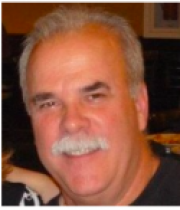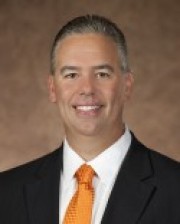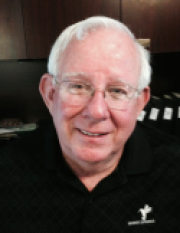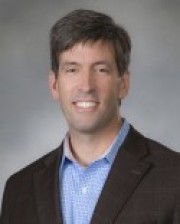CPA Firm Partner – Mentor, Brent Curry
This mentor is the managing partner of a highly respected accounting firm as well as the Past President of the National Board of Directors of the Oklahoma State University Alumni Association and a current member of the Board of Governors of the University’s Foundation. He grew up on a farm and ranch in rural Oklahoma and put himself through college by raising his own cattle, share cropping neighbors’ land and working in the school cafeteria. Brent majored in accounting and joined a national accounting firm after he graduated from OSU. He worked there for four years and then moved to a regional firm where three years later he was made a partner when he was only 29. Brent continued to advance and became the managing partner of offices in two different cities and then managing partner of the entire firm. While many people consider accountants to be introverted, Brent points out that you actually need to have an outgoing personality to be able to develop the relationships necessary to attract new clients, one of the primary roles of partners at an accounting firm. He also talks about the fact that as a public accountant you get to meet a variety of interesting people and learn about many different kinds of businesses. His article should be of interest to anyone considering accounting as a profession and especially young people who want to learn more about public accounting and how to advance in a public accounting firm.
Overview
 I grew up working for my father on a farm and ranch in Oklahoma. Although we owned some land and our own equipment, most of the land we worked was share cropped where we split the profits with the landowner. It was a tough way to make a living. But working for my Dad taught me how to work hard without complaining. Because of that experience, I was confident that I could compete in any business situation because I knew I could work harder than anyone else.
I grew up working for my father on a farm and ranch in Oklahoma. Although we owned some land and our own equipment, most of the land we worked was share cropped where we split the profits with the landowner. It was a tough way to make a living. But working for my Dad taught me how to work hard without complaining. Because of that experience, I was confident that I could compete in any business situation because I knew I could work harder than anyone else.
When I was a senior in high school, I went to a leadership program called Boys State where we studied state government and participated in mock elections. This was a one-week program that is sponsored by the American Legion in all states not just Oklahoma and something young men in high school should consider. While I was there I meet a counselor seven years older who had gone to OSU. He invited me to come with him and visit the campus. After he showed me around the school and talked to me about all the opportunity his OSU degree had given him, I decided that OSU was where I wanted to go to college. Like many young people, I didn’t know what I wanted to choose for a major. So I looked through the school newspaper where all the companies interviewing students for jobs were listed. I noticed that almost all of them were looking for accounting majors. I wanted to be sure that I would have a job when I graduated, something that became even more important to me after I was married at the start of my senior year. So I majored in accounting and later joined the honorary accounting and finance organization for students and professionals, Beta Alpha PSI, as a way to begin to build a network in the accounting profession.
You should know that one of the advantages of going to a larger school like OSU where it is highly competitive is that these schools attract recruiters who want to find new graduates to fill their entry level positions. These recruiters know that people who can succeed in this kind of highly competitive university environment are well prepared to be able to succeed when they enter the business world. OSU also has a good career counseling system that helps you find a job when you graduate as well as an active alumni group that will help you network throughout you business career. These are important things for you to consider when you choose a college.
There are two general areas of accounting, public and private. Public accounting involves working for a firm that provides services to other companies like doing taxes and audits where private accounting generally involves working for a business where you are managing the company’s accounting functions like general ledger, accounts receivable and payable and payroll. When I began to interview I found out that it was easy to make the transition from public accounting to private accounting but hard to move from private accounting to public. I decided to go into public accounting to give myself some flexibility in case I decided later I wanted to do something different. I interviewed as many companies as I could and found that the more I interviewed the better I got. After a few interviews, I was not as nervous and was better prepared to answer the recruiter’s questions. I received several offers and decided to go with a national public accounting firm that was recruiting for their Wichita office. I worked there four years. But I saw that the opportunities for advancement at a large firm were going to come slowly and moved to a smaller, regional firm in 1976. I made partner in 1979 when I was only 29. Five years later I was made partner in charge of the office. Two years after that, the partner in charge of the Tulsa office retired and I moved there to manage that office and eight years ago was named the managing partner of the entire firm.
I was able to advance rapidly in this regional firm in part because of people I met who mentored me. While I was in Wichita, the managing partner of the office gave me the opportunity to go with him on a trip he made once a year to visit clients in far western Kansas. I was a little apprehensive because two new accountants like me who had gone with him on these trips were both let go the day after they returned. But it turned out to be a good opportunity for me. It was a four-hour drive each way, so we had a chance to talk and get to know each other. When we arrived, he put me in a hotel room with a card table and a chair and gave me some work to do to prepare for the clients while he went out and had dinner with them. He didn’t get back until 11 o’clock and saw me still working at that table. He asked me if I had gotten anything to eat and I said no. He asked me why I was still working and I told him that nobody had told me to stop. So he told me to quit and took me to meet with the clients the next day. As part of that meeting, we went pheasant hunting and played golf and poker with the clients. This was pretty nice for a young guy just 24. While I never had a close personal relationship with him after we got back to the office, a lot of opportunities for me to perform and show what I could do that led to me becoming a partner came from that meeting.
Another mentor was actually a client of mine who was an executive for Coleman, a large company that made camping gear. When my wife and I moved to Wichita, we did not know anyone. He introduced me to people and got my wife involved in the Junior League. That became important as a way to introduce myself and my firm to potential clients. My wife’s involvement in Junior League after we moved to Tulsa was also beneficial in getting organized. This was important because one of your responsibilities managing an office is to bring in new business. These kinds of contacts with business people who need accounting services are important. As a public accounting firm, advertising is really not effective generating new business. You have to build relationships so that people like and trust you. Then when they have a need for accounting services they will come to you. It is also important to understand that most successful people already have an accounting relationship. They are not going to change unless they become dissatisfied or someone they like leaves. So you have to build long term relationships with many people with the understanding that you are not going to be able to just ask many of these people for their business and expect them to make a change.
Public Accounting
When I graduated from college, accounting was a four-year program. It now requires five years to be able to sit for your CPA exam, a certification that will improve you earnings potential and something I would recommend.
The first three years as a public accountant you are going to be working on tax returns and audits of companies that are needed for banks and regulators. As you advance, your job will become a combination of management and public relations. You will be supervising more people and also doing more consulting. You will also be expected to be able to bring in new business and maintain existing client relationships. So you are going to be socializing with people who need your services. Young people who advance in public accounting firms are not necessarily those who are the most technically competent. Good people skills are also necessary in order to manage people as well as attract new clients.
The hours you will work in a public accounting vary with tax and audit reporting periods. The most hours you work in a public accounting firm would be tax season between January 15th and April 15th. During that time you can expect to work 50 to 60 hours per week with some work on weekends. New people at the major public accounting firms used to be expected to bill out 72 hours per week during this period, which meant working 12 hours per day six days per week not including lunches. There are other times during the year where there are quarterly tax returns and reporting requirements for banks and security regulators that are also busier than normal. But when the workload is not as heavy as it is during tax season, you can have some flexibility in your schedule if you want to advance your education or just need to arrange your schedule for personal reasons. You should know that most public accounting firms will encourage you to take additional classes and will reimburse you for your tuition if your studies relate to accounting. As a CPA, education is on going. You are going to be required to take 40 hours of continuing education each year to maintain your certification.
You also need certain personal characteristics to be successful as an accountant:
- You have to be honest. Integrity is something that is expected of an accountant.
- Everybody makes mistakes. You have to freely admit yours and tell people you will fix the problem.
- You have to be a friendly person who likes people. This will help you attract mentors and later generate new business for your firm as well as manage the people who work for you.
- You have to be willing to work hard. You don’t work less as you advance just at different things.
How to Prepare
You must know math. But math is not the most important subject for you to take when you are in high school based on my experience. The image of the accountant sitting in the back room with green eye-shades is just not the way successful people in the accounting profession behave. You are actually going to be going out and meeting people for audits and helping them prepare taxes as well as socializing and doing public relations. To do this well, you have to be a good communicator. So take everything you can that will give you experience talking in front of people including speech, debate and even theater. I was not particularly good in math. But I did interact well with people and found that skill was more valuable to me as I advanced in my career.
As I mentioned earlier, you should attend a college that is competitive enough that recruiters visit it every year. Also find a school that has a program to help you find a job. Build a network and join accounting organizations on campus like the professional accounting and finance organization I mentioned, Beta Alpha PSI. You can also look for alumni accountants who come on campus for this organization’s events and meet them as another way to build your network.
Summary
I have enjoyed my career in accounting. I get a lot of satisfaction helping my clients make good decisions for their businesses and families. I also enjoy training and working with the younger staff to help them advance their careers. I have been able to meet a lot of interesting people and have been exposed to many different businesses. That variety has kept the job interesting for me over the past forty-three years. As a public accountant, you are asked to make a lot of decisions early in your career and can gain responsibility quickly if you perform. It is a career I would recommend to anyone who is willing to work hard, who likes people and is able to build strong personal relationships. It is also a career where you can earn a good living and provide well for your family.
US Bureau of Labor Statistics for Accountants and Auditors
Pay for an Accountant from BLS
The median annual wage for accountants and auditors was $63,550 in May 2012. The median wage is the wage at which half the workers in an occupation earned more than that amount and half earned less. The lowest 10 percent earned less than $39,930, and the top 10 percent earned more than $111,510.
In May 2012, the median annual wages for accountants and auditors in the top five industries in which they worked were as follows:
| Finance and insurance | $66,530 |
| Manufacturing | $65,300 |
| Management of companies and enterprises | $64,670 |
| Accounting, tax preparation, bookkeeping,
and payroll services |
$63,910 |
| Government | 61,490 |
Pay for a CPA from Payscale.com
A senior tax accountant with over 20 years of experience earns somewhere between $60,000 – $85,000 per year based on their 2015 salary survey. Meanwhile, a CPA with 20 or more years of experience earns between $65,000 – $110,000 per year. Thanks to the extra training and certification required, CPA salaries cross the six-figure threshold.
Job Outlook from BLS
Employment of accountants and auditors is projected to grow 13 percent from 2012 to 2022, about as fast as the average for all occupations. In general, employment growth of accountants and auditors is expected to be closely tied to the health of the overall economy..








